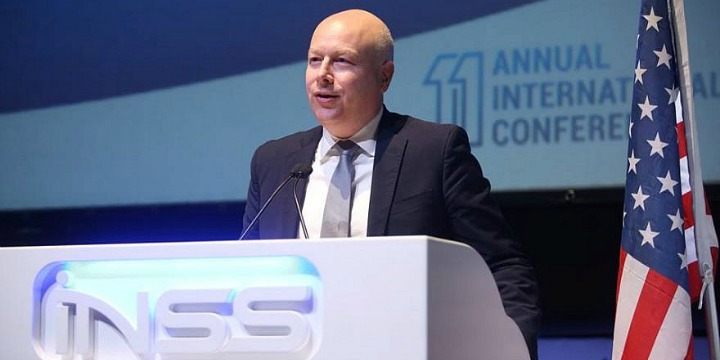The Palestinians Should Support Greenblatt, Who’s Telling Them the Truth

Photo: INSS via Facebook.
JNS.org – In politics, and especially the politics of the Middle East, it is rare for government officials to speak the unvarnished truth. That is why the comments of Jason Greenblatt, US Special Representative for International Negotiations, at the United Nations are notable.
At a closed-door UN Security Council Meeting held on March 8, 2019, Greenblatt condemned the Palestinian Authority (PA)’s continued support for financial payments that incentivize and reward terrorism, known as “pay to slay.” The PA’s refusal to end these programs, coupled with subsequent funding cuts by the United States and Israel, have plunged the PA into a self-manufactured fiscal crisis.
According to Greenblatt:
The Palestinian Authority’s institutionalization of support for terrorism is unacceptable and must be called out, unequivocally by all of us. The time has come for everyone to stop looking the other way. [emphasis in original]
And:
It is because we care about the Palestinian people, and because we want a better, brighter future for their children that we seek to ensure the Palestinian Authority puts the interests of ordinary Palestinians first. [emphasis in original]
Greenblatt’s truth-telling was too much for others in the room, cocooned as they are in their entrenched beliefs of the PA’s misrepresentations and inability to accept any responsibility for its actions. His lone voice of reason was left to echo in the ears of those who refuse to acknowledge what has become clear: The PA’s support for terror is wrong on all accounts, incompatible with peace, and accrues to the detriment of the Palestinian people.
In response to Greenblatt’s comments, Saeb Erekat, secretary-general of the PLO and chief Palestinian negotiator, penned an op-ed in Haaretz. In rejecting Greenblatt’s comments and accusing him of “blaming the victims,” Erekat does not use the word “terror” once in the 799 words of his response. Nowhere does he mention the PA’s cradle to grave incitement to hate and murder Israelis and Jews, or the seven percent of the PA’s budget that is used to incentivize and reward terrorism.
Erekat defaults to the false claim that “pay to slay” is social welfare. In reality, the maximum PA welfare-system payment is only $168 a month, or 57 percent less than the minimum of $392 a month that the PA pays prisoners and relatives of so-called “martyrs.” Only those who commit acts of terror are considered the PA’s “fighters,” and are paid at the higher rate; other Palestinians must participate in the less lucrative conventional PA welfare system.
In Erekat’s narrative, the Palestinian people are innocent victims of Israeli oppression. The innocent “victims,” according to Erekat, are “all Palestinian families” that have relatives languishing in Israeli prisons as “political prisoners.” Yet he refuses to acknowledge why they are there: because they were detained for or convicted of security offenses. He also refuses to acknowledge the true innocent victims here: Israeli families on the other side.
Israel’s withholding of PA tax funds in the amount that the PA uses to pay terrorist prisoners — derided by Erekat as “piracy” — is calculated based upon payments to detained and convicted security prisoners only, and does not apply to political prisoners or those jailed for other reasons.
These types of tired PA claims and the abdication of any personal or national responsibility were long considered acceptable currency in international diplomatic trade. Recent legislation such as the Taylor Force Act in the United States and the Dichter/Stern Act in Israel have exposed these claims as counterfeit. Greenblatt’s courageous comments affirm this trend, and it behooves all parties involved, especially the Palestinians, to support him and to acknowledge that no progress will be made until his words are put into practice.
Originally appeared in The Algemeiner on April 5, 2019.